
A new $76 million plant in
Nebraska is utilizing the methane from cattle manure, but instead of
running it through a generator and producing electrical power, it is
using the methane to fuel an ethanol plant.
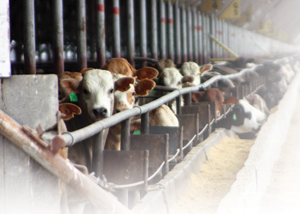 |
| E3 BioFuels has acquired a controlling interest in the Mead Cattle Company LLC, an existing clean manure feedlot, meaning the manure contains a minimal amount of dirt, sand and water as compared to conventional dirt feedlots. The feedlot has a capacity of 30,000 head and generates about 228,000 tons of manure annually, the equivalent of a city of 350,000 people. |
A new $76 million plant in Nebraska is utilizing the methane from cattle manure, but instead of running it through a generator and producing electrical power, it is using the methane to fuel an ethanol plant.
A new plant on the Great Plains is taking the generating energy-from-manure methane business model and adjusting it slightly. Instead of producing electrical power, the Genesis plant is producing ethanol, using methane as fuel.
The manure generated by a Nebraska-based feedlot is the raw material being used to produce the bio-gas needed for the $76 million,
self-sustaining, closed loop ethanol production system built by E3 BioFuels near the community of Mead.
“By taking the manure and capturing the methane and then burning the methane, we take what was a waste product and turn it into a valuable asset,” says Dennis Langley, president and chief executive officer of E3 BioFuels. “Our system also has great environmental benefits.”
By producing and burning methane bio-gas, E3 BioFuels is reducing the impact of this contributor to greenhouse gases, and is managing the solid and liquid by-products of the bio-gas generation process so they no longer contribute to water pollution.
In addition to major environmental benefits, the company says its patented technology represents a dramatic advantage over its ethanol production competitors because its system offers vastly superior energy efficiency. The company says it can produce ethanol 55 cents per gallon cheaper than traditional ethanol plants, mainly because it does not use fossil fuel energy to produce ethanol. The use of bio-gas instead of natural gas to produce ethanol gives E3 BioFuels the confidence to predict its ethanol plants will save millions of dollars annually in energy costs compared to its competitors.
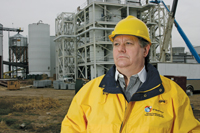 “By taking the manure and capturing the methane and then burning the methane, we take what was a waste product and turn it into a valuable asset,” says Dennis Langley, president and chief executive officer of E3 BioFuels. “Our system also has great environmental benefits.” “By taking the manure and capturing the methane and then burning the methane, we take what was a waste product and turn it into a valuable asset,” says Dennis Langley, president and chief executive officer of E3 BioFuels. “Our system also has great environmental benefits.” |
“This technology is cutting edge and simultaneously addresses so many different problems,” says Langley. “It will become the next standard for ethanol production.”
The E3 BioFuels system delivers a strategic benefit to the U.S. by creating an opportunity for the country to become less dependent on foreign sources of energy while at the same time delivering an environmental dividend. It also creates a new agribusiness income stream.
The Mead plant, constructed by Indiana-based Dilling Construction, is located in an area where there is a significant over-production of corn, to the point where locally produced corn is sold at a discount. That is one reason why E3 BioFuels chose to locate its first plant in this area of the American agricultural heartland. There is an abundant and affordable supply of corn feedstock to produce ethanol.
“These projects have the potential to deliver a huge uplift for rural America,” says Langley. In addition to a plant of this size consuming about eight million bushels of corn annually, it also creates about 70 new jobs.
“Good paying jobs are going into areas that have been losing populations as a trend for the last 100 years,” he says. “Now they are gaining populations, and not only gaining populations, but gaining populations with good paying jobs. Many people prefer a rural lifestyle, but really don’t have an economic choice concerning where they live.”
One knock against conventional ethanol production is how much fossil fuel it takes to produce the ethanol. The most efficient ethanol plants in operation today need about 36,000 BTUs of thermal energy, typically in the form of natural gas to produce one gallon of ethanol. The E3 BioFuels system uses no fossil fuel.
Large generators of manure from intensive livestock operations should pay close attention to what this alternative energy producer has developed. Should the company’s concept catch on, it has the potential to help concentrated animal feeding operations (CAFOs) comply with new Environmental Protection Agency (EPA) rules related to the disposal of manure.
 “This is our first intensive foray into the business,” says E3 BioFuels president and chief executive officer, Dennis Langley. “We take one BTU inside the plant gate and deliver 46.67 BTUs leaving the plant, which is the equivalent of an oil refinery producing 15 gallons of gasoline. We’re dramatically better in energy efficiency than anything else out there that is burning fossil fuels in order to create ethanol or gasoline.” “This is our first intensive foray into the business,” says E3 BioFuels president and chief executive officer, Dennis Langley. “We take one BTU inside the plant gate and deliver 46.67 BTUs leaving the plant, which is the equivalent of an oil refinery producing 15 gallons of gasoline. We’re dramatically better in energy efficiency than anything else out there that is burning fossil fuels in order to create ethanol or gasoline.”
|
“We offer our joint venture partners free CAFO compliance,” says Langley. “We spend the funds that are necessary to bring them into compliance. When we locate at an existing dairy or feedlot, we retrofit them at our expense.” Not only do they become compliant with new EPA nutrient management rules, the ethanol production system also prepares them for imminent new regulations regarding discharge of particulate matter and odor management. Because the system developed by E3 BioFuels is a closed loop system, it virtually eliminates water, air, greenhouse gas and odor pollution caused by CAFOs. What is innovative about the company’s approach is that it integrates previously unconnected components – specifically a solid waste management facility, an ethanol plant and a CAFO. By doing so, it not only qualifies for federal and state grants related to solid waste management, but also ethanol production credits – another clear advantage over both intensive livestock and ethanol competitors.
The company’s Genesis plant near Mead is the first commercial-scale, integrated system of its kind in the world and is largely the culmination of a dream for Langley.
He has plenty of experience working in the conventional energy industry, including creation and operation of the Kansas Pipeline Company from 1984 to 1999. During his tenure, the company’s market share of residential natural gas customers in Kansas City grew from zero to 30 percent.
After the sale of Kansas Pipeline, Langley focused on renewable energy and created a company called Earth, Energy and Environment (E3), taking a particular interest in ethanol production because of its ability to substitute for foreign conventional oil, add value to corn grown by American farmers and reduce emissions in the transportation sector. Since 1999, the company has been focused on fine-tuning ethanol production systems, leading to the construction of a commercial-scale facility that can be replicated.
“Over a 10 year period, we researched ethanol production and visited or reviewed approximately 80 existing or proposed facilities,” says Langley. “This is our first intensive foray into the business. We take one BTU inside the plant gate and deliver 46.67 BTUs leaving the plant, which is the equivalent of an oil refinery producing 15 gallons of gasoline. We’re dramatically better in energy efficiency than anything else out there that is burning fossil fuels in order to create ethanol or gasoline.”
 Wet distillers grain is fed directly to livestock within Mead Cattle Company, Wet distillers grain is fed directly to livestock within Mead Cattle Company, the on-site cattle feedlot, eliminating the need for drying, storage and transport of the material. This is a major advantage the E3 BioFuels system has over other ethanol producers, which usually need to dry the material, using natural gas or coal-powered evaporation systems and dryers to prevent spoilage during transport.
Contributed Photos.
|
E3 BioFuels has also acquired a controlling interest in Mead Cattle Company LLC. It is an existing clean manure feedlot, meaning the manure contains a minimal amount of dirt, sand and water as compared to conventional dirt feedlots. That is because it is enclosed and has a slatted floor and a collection pit below. This results in the efficient collection and removal of the manure. The feedlot has a capacity of 30,000 head and generates about 228,000 tons of manure annually, the equivalent of a city of 350,000 people.
The E3 BioFuels system requires a minimum of 16,000 head of dairy cattle concentrated within a 15 mile radius to supply the manure needed for its system, or 20,000 feedlot animals.
It starts with the ethanol plant taking in corn or other feed grains purchased from local farmers. The plant produces ethanol as well as a spent grain material called wet distillers grain (WDG). The Mead plant will produce about 24 million gallons of ethanol annually.
The WDG is fed directly to livestock within the on-site CAFO, eliminating the drying, storage and transport of the material. This is a major advantage the
E3 BioFuels system has over other ethanol producers. Those producers typically are not so close to WDG customers, so they must dry the material, using natural gas or coal-powered evaporation systems and dryers to prevent spoilage during transport.
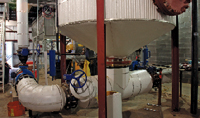 E3 Biofuels’ Genesis plant uses bio-gas instead of natural gas to E3 Biofuels’ Genesis plant uses bio-gas instead of natural gas toproduce ethanol, giving the company the confidence to predict its ethanol plants will save millions of dollars annually in energy costs compared to its competitors. |
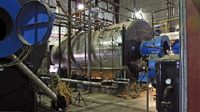 E3 Biofuels’ Genesis plant uses bio-gas instead of natural gas to E3 Biofuels’ Genesis plant uses bio-gas instead of natural gas toproduce ethanol, giving the company the confidence to predict its ethanol plants will save millions of dollars annually in energy costs compared to its competitors. |
The manure generated by the cattle falls through slats in the floor, and is sucked out and delivered using semi-tractors/tank trailers to the system’s on-site solid waste management facility or to a lagoon if the facility is non-operational for some reason. The manure is processed through an anaerobic digester. The material entering the digester is a mixture of manure and thin stillage, which is also a by-product of ethanol production. This mixture increases the digester’s efficiency and output of both bio-gas and bio-fertilizers.
| E3 BioFuels launches Genesis plant E3 BioFuels launched its high efficiency Genesis Plant June 28 in Mead, Nebraska. “This is the next generation of ethanol and it’s in production today,” says E3 BioFuels president and CEO Dennis Langley, who was joined by Nebraska Governor Dave Heineman in a press conference before leading a tour of the plant. “Our process lets America get its automotive fuel from the croplands of the Midwest instead of the oilfields of the Mideast.” “This plant sets a new standard for ethanol production in this state and our nation, and is an example of the innovation needed to take this industry to the next level,” says Governor Heineman. “We are very proud to be the home of this facility. It is an indicator that our state is committed to finding creative ways to use our natural resources in producing a more efficient and homegrown fuel.” U.S. Senator, Chuck Hagel (R-NE) commended E3 BioFuels on its breakthrough closed loop process, saying, “Investment in ethanol will be critical to address our nation’s growing energy needs. Ethanol and renewable fuels will create a wider and deeper domestic energy portfolio while providing important markets for Nebraska’s agricultural producers. With the new facility in Mead, E3 BioFuels expands on this ever-growing market while being innovators in environmental stewardship.” Langley says E3 BioFuels intends to locate more plants in several other U.S. states and will license the technology for others to use as well. “This high efficiency plant represents the next evolution of the bio-fuels industry,” says Langley. “Here in Mead, we’re taking a giant leap toward energy independence while at the same time providing tools to meet our waste management and global warming challenges.” |
Anaerobic digestion is generally the action of bacteria that live in an environment without oxygen. With the addition of heat to accelerate the action of the bacteria, the organic waste is converted to bio-methane gas, compost and liquid fertilizer over a maximum two month period. The Mead digester will operate at about 99 degrees Fahrenheit. While the bio-gas produced by the digester is providing nearly 100 percent of the ethanol plant’s energy needs, the waste heat generated from ethanol production is used to meet the heat requirements of the digester.
The solid and liquid by-products of the digestion process are removed on a regular basis as required by the anaerobic cycle. The liquid fraction of the bio-fertilizer by-product is passed through a nutrient concentration step where the nitrogen, phosphorus and potassium is concentrated and removed, leaving behind potable water that is used for irrigation.
The digestion process also produces a diluted stream of liquid ammonia, which is collected and sold to farmers as an EPA compliant fertilizer. They use it as a liquid fertilizer that is injected about eight inches below the soil surface, thereby eliminating concerns of surface runoff, which typically occurs when raw manure is applied to the soil surface as a fertilizer.
The remaining solid compost from the digester is pathogen-free and can also be applied as a natural fertilizer. Some is applied on the feedlot’s own land. Most is sold to area farmers or bagged and sold as an all-purpose garden compost. It also works well as dairy barn bedding.
The payback periods for manure methane powered ethanol plants will vary. Depending on the price of corn and ethanol, an E3 BioFuels installation could pay for itself in as little as three years, but no more than 10 years, according to Langley.
E3 BioFuels is aiming to build three ethanol production facilities (using manure as the main feedstock) per year over the next five years and recently announced plans to locate a facility in southeast South Dakota. The company also has the option of licensing its system to other operators.
“We’re going to be as aggressive as we can to meet the needs that are being presented,” Langley says.
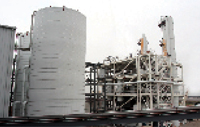 The solid and liquid by-products of the digestion process are removed on a regular basis as required by the anaerobic cycle. The liquid fraction of the bio-fertilizer by-product is passed through a nutrient concentration step where the nitrogen, phosphorus and potassium is concentrated and removed, leaving behind potable water that is used for irrigation. The solid and liquid by-products of the digestion process are removed on a regular basis as required by the anaerobic cycle. The liquid fraction of the bio-fertilizer by-product is passed through a nutrient concentration step where the nitrogen, phosphorus and potassium is concentrated and removed, leaving behind potable water that is used for irrigation.
 The company’s Genesis plant near Mead, which began production of ethanol in December 2006, is the first commercial-scale, integrated system of its kind in the world. The company’s Genesis plant near Mead, which began production of ethanol in December 2006, is the first commercial-scale, integrated system of its kind in the world.
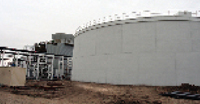 Since 1999, E3 Biofuels has been focused on fine-tuning ethanol production systems, leading to the construction of a commercial-scale facility that can be replicated. Since 1999, E3 Biofuels has been focused on fine-tuning ethanol production systems, leading to the construction of a commercial-scale facility that can be replicated.
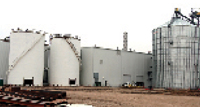 The E3 BioFuels system delivers a strategic benefit to the US by creating an opportunity for the country to become less dependent on foreign sources of energy while at the same time delivering an environmental dividend. It also creates a new agribusiness income stream. The E3 BioFuels system delivers a strategic benefit to the US by creating an opportunity for the country to become less dependent on foreign sources of energy while at the same time delivering an environmental dividend. It also creates a new agribusiness income stream. |